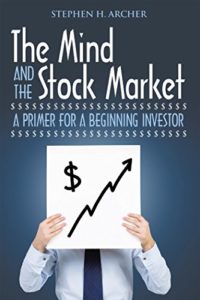Author Stephen H. Archer provides crucial investment advice in his new book, The Mind and the Stock Market.
 My book, The Mind and the Stock Market, is primarily a book for those who want to begin to think about investing savings for the future use: retirement, providing for heirs, becoming wealthy. Where should they start? Many established investors have found it a useful review and perspective. Some say, “I wish I had read it forty years ago.” The subtitle of the book is: A Primer for a Beginning Investor. I selected the title of the book as a marketing ploy to attract readers, but the subtitle is more descriptive of the contents.
My book, The Mind and the Stock Market, is primarily a book for those who want to begin to think about investing savings for the future use: retirement, providing for heirs, becoming wealthy. Where should they start? Many established investors have found it a useful review and perspective. Some say, “I wish I had read it forty years ago.” The subtitle of the book is: A Primer for a Beginning Investor. I selected the title of the book as a marketing ploy to attract readers, but the subtitle is more descriptive of the contents.
Following a Masters degree in Economics, I went to work for an investment firm in Minneapolis. The securities industry sounded exciting and perhaps a route to personal wealth. My parents, who were teachers, taught me that I did not want to always live on a tight budget. At the investment firm I started doing research, but followed my adventurous nose into the market by trading securities. In 1950 the Navy cut off any further investment experience. On return, having lost my trading job and found that sales was not for me, I chose to earn a doctorate degree in finance and began my university teaching career. I became a Fulbright Scholar and a Ford Fellow, teaching and pursuing research and writing in investments and lecturing In Italy, England, Japan, and Switzerland. In 1969, my leave from academia took me to be a Vice President of an investment dealer in Seattle for a year.
In my studies at the university, I was introduced to Benjamin Graham who in 1931 published a book with David Dodd, titled Security Analysis. The text became the ‘bible’ for value investing. This was first formal presentation on computing the value of a security. This computed value should be compared to market price. If the value was above price, it could be a buy; if value was below price, market price should fall, so sell. Graham followed this value investing with another book: The Intelligent Investor in 1949.
My colleague at the University of Washington and Nobel prize winner, William Sharpe, introduced the investment concept of a security’s relation to the market in valuation. Hence the importance of alpha and beta in security valuation, leading to my book, Portfolio Analysis with Jack Francis.
These all involved a mathematical/statistical approach to the investment decision. Yet in my interface with investors in “personal finance” classes and my experience in the securities business told me that the investment decision involved errors of the mind. The human side of the investment decision is rarely mentioned. Frequently, emotions are involved. The investment decision is often involved with mental errors like the tendency to avoid acknowledging losses. This error may be referred to as loss aversion, where an unrealized loss is not acknowledged.
John buys a stock at $30. a share; the price in the market declines to @21. John refuses to accept the loss. He does not want to admit he made an investment mistake. He hopes the price will recover. He sticks with it, whereas he should reexamine its value. He should have come to the conclusion it was not headed to his target price. He could have entered a stop order to hedge against a large loss.
Pete heard his neighbor bragging his success with XYZ stock and he buys. Oops! He should have done his own evaluation. Alice has funds sitting in a bank account paying almost no interest; she buys ABC shares without study because she heard about the market and likes the name, ABC.
Investing takes planning and study. Is the company doing what s/he understands. Appraise its profitability and value. Be objective as if you were going into business with this company. Are the price fluctuations in the market something you can live with?
The purpose of my book is to convey to a beginning investor the range of investing vehicles, to be objective in evaluation of specific investment, the importance of stock diversification using portfolio analysis and the additional value of allocating investment among several assets to reduce the risk of overall investment.
The one message I try to convey is do not ignore that the mind can play an important role in the investment decision. As a beginner, do your homework and be objective in making your investment decisions. Have a plan.
I do not plan to write a sequel but I wish I could do it over again, expanding on some topics. However, I received very favorable reviews from Clarion, and Blue Ink, as well as testimonials from those I know. I also invested in some publicity from a professional organization, which I do not yet know of its impact.
Make sure to check out the iUniverse site for more advice and blogs, as well as iUniverse Facebook and iUniverse Twitter. For a FREE Publishing Guide, click here!
Related posts:
In this excellent how to create a book series of posts from iUniverse blog guest author, Lisa K. Dru...
iUniverse’s Emi Taran talks about her new book, A Christmas Story – perfect for this Yuletide season...
iUniverse continues with its presentation of writers who, despite falling from popularity, still off...

